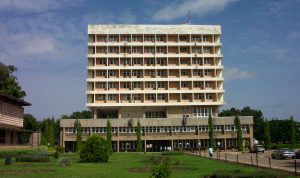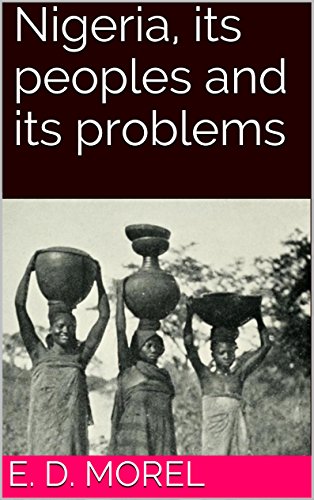By Ambassador Usman Sarki
“One day holds much – so much of time, so much of space, so much of change”, E. D. Morel
Not everything that is new or innovative is particularly progressive or desirable. A lot of good things have been done in the past that if maintained could have propelled our country to higher levels of development by today. The area of education is one such fundamental endeavour that Nigerians, particularly those in the North, should pay attention to, and revisit with a sincere sense of judicious disappointment and discontent with the obtainable state of affairs in the sector currently.
Reading the book “Nigeria – Its Peoples and Problems” by Mr. E. D. Morel, has been one of the most inspiring, edifying and exhilarating experiences that I have had the good fortune to go through. His perceptive account and sympathetic recording of his experiences in Nigeria particularly in the North in 1911, have fundamentally affected my understanding of the way this great country of ours was founded, formed and shaped by the British.

ABU Senate Building
One area in which the decisive application of attention was made was education. In this respect, it would be impossible to write an account of the system of teaching and training of individuals without mentioning the merits of Mr. Hanns Vischer, the Director of Education in Kano Province around 1911. His accomplishments have been copiously narrated by Mr. Morel in his extraordinary book that I have cited above. This short essay therefore, is in honour of this selfless individual and a tribute to the sagacious minds that first conceived the policy of educating the Northerners in the unique schools that they established.
Having a sense of history more than anything else is the catalyst of national greatness. The spirit of higher ideals and lofty dreams must therefore permeate our educational plans and strategies in Northern Nigeria today. Every effort must be made to recapture the ethos of education based on connection with the larger society and with the needs of posterity. Of all human endeavours, education is the only one that impacts on every other. Education should seek to mold the character, mind and body of the student, developing strong bodies, healthy minds and high spirits in the country’s youths.
Education must not be by rote or rendered a mere routine of studies and examinations. In-between there must be inclinations towards learning, incentives, motivations and interests in the subjects and the keen awareness by both the teachers and students of the higher purposes to which they are being called. Above all else, education must aim to produce leaders and citizens steeped in tolerance who are broad minded enough to accommodate all shades of divergent views and tendencies, thereby becoming the channels towards creation of harmonious coexistence among the diverse peoples that make up our societies.
Only in this way can we produce people who are morally, physically and mentally better fitted to lead and transform our societies at every level of endeavour particularly in governance. There are many paths to national development and securing of the future of every society. Education should be one of them if not among the most important. Education must be linked to the future of the society and not of the individual alone as it seems to be the case today. It is not enough to build the character of the individual only, without transforming the character of the society through the education of the individual.
As such education should aim to achieve higher spiritual objectives based on meeting the aspirations of the nation and building the foundations for a peaceful, secure and prosperous society across generations. In many countries, schools that are considered as the foundations of their prosperity and success are celebrated and held in the highest esteem. One such institution is the Nankai High School or Academy in Tianjin, China, which is one hundred years old now. Famous Chinese citizens such as Premier Chou Enlai were educated and formed in that venerable institution.
Why are we not able today to celebrate our old schools in Northern Nigeria like the Nasarawa School for Teachers and sons of emirs and chiefs? Why are we unable to recall the glories of Katsina College and Keffi Government College? Why are we not today in a position to recall the students who passed through Barewa College, Sheikh Sabah College, Kano Technical College and others of renown in our societies? This sense of “lost” history of our educational institutions has made it possible to down-play the importance of such institutions in the development and spiritual advancement of the North.
Education is supposed to provide the opportunities for the enlargement of the mental faculties of the students. This fact alone should have made successive governments or administrations in the North to accord a special priority to establishing better schools and other institutions of learning. Education is also supposed to create a pool of structurally disciplined and enlightened people to man government institutions. In this way the building of progressive and forward-looking communities can be assured and even made a matter of course and sincere appreciation.

Education Minister, Adamu Adamu
Without such an aspiration degeneracy always sets in and the stunting of human civilization becomes established. Corruption will then take over and various other negative tendencies and forces will emerge that will ultimately subvert the system of government and overwhelm the people. It seems owing to the absence or lack of properly coordinated and delivered educational systems, this nightmarish specter is already looming over us and is threatening to overshadow our existence.
When properly established and delivered, education is supposed to provide professionals to man our essential institutions and provide the required expertise to attend to the needs of all our societies. Education thus should create a crop of agriculturalists to serve the food sector and ensure our nutritional wellbeing. Our schools should train artisans and technical people to provide the work force that is required to maintain our sophisticated everyday existence. By going to school we should expect to produce or create a people with a high sense of commercial awareness and astute business acumen.
Our educational policies should lead to literally the production of people with a decent outlook about life and towards work in all spheres of human endeavour. Our medical needs and general welfare should be entrusted to highly qualified and conscientious body of men and women steeped in the tradition of selfless service towards humanity. Above all else, education should create citizens with a forward looking mind-set and respectful disposition towards higher authorities and order thereby maintaining the equilibrium of life.
Being a source of fun and entertainment, our schools should produce fine sportsman and women able to compete in various disciplines of exertion and labour in all organised forms of mass entertainments. Education should ultimately be connected to producing nationalistic feelings in the citizens without which the idea of a nation or nationality becomes watered down and of little import in building of our civilization. Towards these ends, the foundation of education should be the teaching of history and geography. In history the students should learn about their past and present, and chart a course for the future.
They must be made to feel a part of a chain or process that started at the dawn of mankind and passing through centuries of human progress, travails and challenges and successes. In geography they will learn about their immediate and remote environment, about the physical features of their world and country, about their resources and natural endowments, about the distribution of races and peoples, about the location of cities and vital economic centers, about transportation and movements of peoples and goods, about the flows of rivers and tides of the oceans and all other subjects convenient to further understanding of the natural and physical world.
Physical geography, economic geography, human demographics, etc should become essential requirements in our early education. Proceeding from these two branches should be the study of languages and cultures of the peoples of Nigeria and Africa, in order to create and instill familiarity and empathy in the students. This should be followed by instructions in the sciences like mathematics, chemistry, biological sciences, physics and other essential subjects that could lay the foundations for the study of medicine, agriculture, engineering, industrialisation, town and city planning, surveying, etc.
Next we should instill the love of sports in all the students across different age and sex groups. This is in keeping with the quest for healthy minds in healthy bodies leading to the attainment of high spirits and confidence in all the students. Technical education, vocational training and skills acquisition must be made essential aspects of the school curriculum in Northern Nigeria. Without these we will only succeeded in producing students fit for a narrow field of work in life, who will end up becoming more of a burden on society and a continuous liability than assets.
Our educational policies must not forget to instill appropriate religious training and spiritual grooming and edification of the students. There cannot be any useful purpose in educating people who will end up spiritually unfulfilled and hence, without correct religious guidance and knowledge. Success in education must be attained only through careful and prudent injection of finances into the sector. This should go towards high grade teacher training and moral fortification, and then only afterwards to the construction of facilities and other physical projects. These two should ideally go hand in hand and be developed simultaneously as the educational policy matures and progresses to higher levels.
There should be strategically located teacher training institutions across Northern Nigeria in which future school administrators and teachers can be formed. Admission into these schools should be spread across the region, so that the students could be pooled from different states and local government areas, who would one day form a network of fraternally connected body of specialists with one common mission and objective in view. These schools should be ranked in two broad categories namely the sciences and the humanities. All categories of subjects should be taught in them that would lead to the comprehensive coverage of the curricula being envisaged for the Northern schools. In this way unity of principle in public policy as stated by Mr. E. D. Morel can be effectively realised. In this way also the labours of heroes past like Mr. Hanns Vischer will be rekindled and kept alive.
The author is a former Deputy Permanent Representative of Nigeria to the United Nations, New York




























